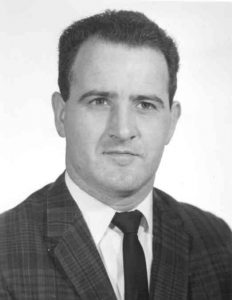
Photo info ...
Credit: Indiana University IndianapolisView Source
(Dec. 4, 1931-Feb. 17, 2017). Born in Ballygar County, Galway, Ireland, Conneally graduated with a bachelor’s degree in agriculture, with honors, from the University College of Dublin in 1954. After serving as an adviser to farmers in western Ireland, he obtained a master’s degree from the University College of Dublin. He pursued further graduate studies at the University of Wisconsin, Madison, graduating with a Ph.D. in medical genetics in 1962. In Madison, he married Mary Stuhlmueller, with whom he had two children.
Following a post-doctoral fellowship at Western Reserve University, Conneally joined the faculty of the (IUSM) in 1964, where he would spend the rest of his professional career. In the mid-1960s IUSM was one of the first medical schools in the U.S. to form a department of medical and molecular genetics, and Conneally was one of its first professors.
A world leader in human genetics, Conneally very early recognized the value of DNA markers for genetic research. He played a major role in discovering the genetic marker for Huntington’s Disease in 1983. In addition to isolating the Huntington’s Disease genetic marker, he, along with researchers from Harvard and the Johns Hopkins University, mapped the actual Huntington’s Disease gene in 1993—the first human gene to be mapped using DNA techniques. Over the course of his career, he helped map 20 human genes that resulted in the identification of 20 percent of the human genome.
Conneally began research on Huntington’s Disease in the late 1960s. He was a member of the Congressional Commission on Huntington’s Disease in the 1970s, and he conducted annual research trips to Venezuela, where the disease is particularly prevalent. He also began collecting gene samples from Huntington’s Disease families across the U.S. Midwest in his search for the gene. These samples provided the foundation for the National Huntington’s Disease Research Roster at Indiana University, which was established in 1979, Containing family trees and demographic data, this roster linked researchers, patients, and family members to promote research projects that identify treatments and cures.
Conneally also conducted important research on the genetics of Alzheimer’s Disease, diabetes, alcoholism, and psychiatric disease. He served as an expert witness at the O. J. Simpson trial and was a member of the World Trade Center and Hurricane Katrina DNA Identification Committees. He authored or co-authored over 500 publications and was editor of five scientific journals.
He received the International Society of Psychiatric Genetics Lifetime Achievement Award in 2001, was named a Top-15 American-Irish-American Life Scientist in 2005, and won the Milton Wexler Prize from the Hereditary Disease Foundation in 2016. He received an honorary degree from Trinity College, Dublin, and was a Distinguished Professor Emeritus at IUSM. IUSM established the P. Michael Conneally Professorship of Medical Molecular Genetics in his honor.

Help improve this entry
Contribute information, offer corrections, suggest images.
You can also recommend new entries related to this topic.